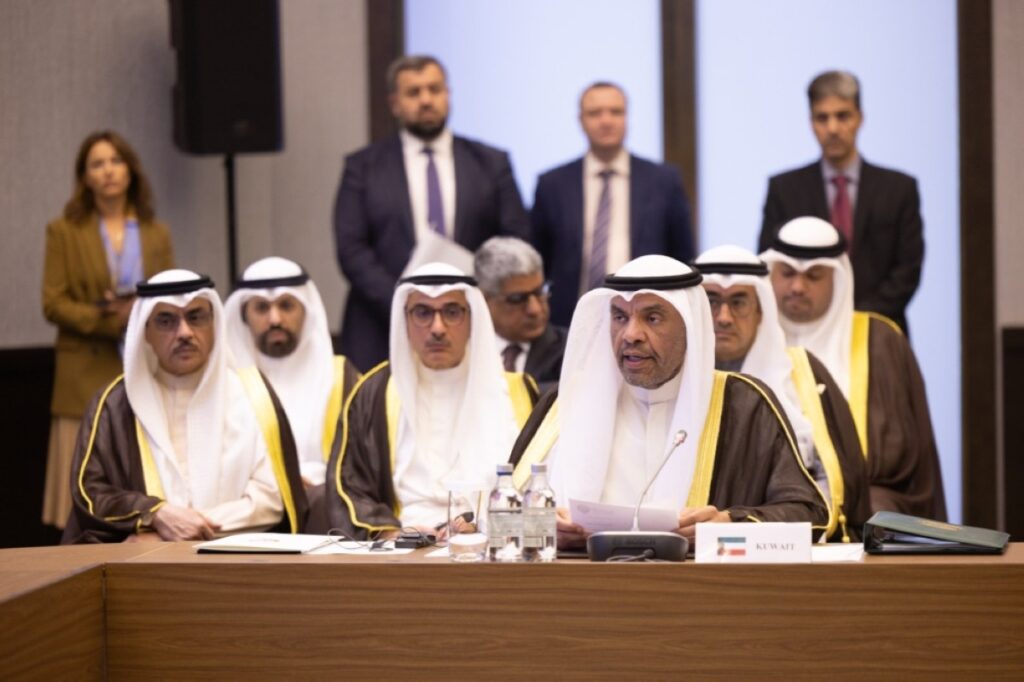SOCHI: Foreign Minister and current chairman of the Gulf Cooperation Council (GCC) Ministerial Council Abdullah Al-Yahya on Thursday reaffirmed the Gulf’s full solidarity with Qatar, stressing absolute support for the measures it takes to protect its people, preserve its security, and safeguard its territorial integrity. He underscored that aggression against any GCC state is considered aggression against all, in line with the Council’s collective responsibility to maintain security and stability in the region.
Delivering Kuwait’s speech at the 8th Joint Ministerial Meeting of the GCC-Russia Strategic Dialogue in Sochi, Al-Yahya strongly condemned what he described as “sinful aggression” by Zionist occupation forces against Qatar, warning that such actions undermine regional efforts to avoid conflict and constitute a dangerous escalation. Al-Yahya highlighted the importance of the GCC-Russia strategic partnership, first launched in 2011 with the signing of a memorandum of understanding that established annual ministerial meetings. He said the framework has since strengthened political, economic, and trade ties while laying the foundation for cooperation on regional and international challenges.
More than a decade on, he noted, the partnership has matured into a symbol of growing trust and shared vision. He pointed to the joint action plan (2023-2028) as a practical expression of collective will, producing tangible programs and partnerships across multiple sectors. “Our convergence is not only based on shared interests but also shared convictions—that cooperation is the basis for peace, dialogue the path to conflict resolution, and partnership the gateway to development and prosperity,” he said.

DOHA: This frame grab shows smoke billowing after explosions in Qatar’s capital Doha. A Zionist military official told AFP that the military carried out air strikes on Doha on September 9 in an operation targeting senior leaders of Palestinian militant group Hamas. – AFP
Turning to the Palestinian issue, Al-Yahya reiterated that peace and stability cannot be achieved without ending the occupation and establishing an independent Palestinian state along the June 4, 1967 borders with East Jerusalem as its capital, in line with the Arab Peace Initiative and UN resolutions. He praised Russia’s stance in supporting a ceasefire in Gaza and its backing for a political process to restore hope to the Palestinian people.
He also denounced Zionist practices of starvation, repression, and displacement against civilians in Gaza, calling for urgent measures to allow humanitarian aid into the Strip. On international issues, Al-Yahya welcomed the recent Alaska Summit between the Russian and US presidents as a step towards resolving the Russian-Ukrainian crisis through dialogue and diplomacy. He reaffirmed the GCC’s consistent position in favor of peaceful solutions to global conflicts that address humanitarian, security, and economic challenges.
Addressing regional concerns, he appreciated Russia’s efforts in encouraging Iraq to resolve outstanding issues with Kuwait, including the return of prisoners, missing persons, third-country nationals, and Kuwaiti property, particularly the national archives. On the maritime boundary issue, he stressed Iraq’s obligation to respect Kuwait’s sovereignty and abide by bilateral agreements, international treaties and UN resolutions to ensure good neighborly relations and regional stability.
Looking ahead, Al-Yahya expressed hope that the upcoming Arab-Russian Summit, scheduled for October 15, will yield positive results that deepen cooperation and bolster collective diplomatic efforts for Middle East security. He thanked Russian Foreign Minister Sergey Lavrov for his hospitality and expressed confidence that the Sochi meeting would further consolidate the strategic partnership between the GCC and Russia — Agencies

